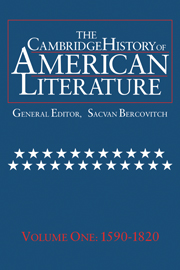Book contents
- Frontmatter
- Introduction
- THE LITERATURE OF COLONIZATION
- NEW ENGLAND PURITAN LITERATURE
- BRITISH-AMERICAN BELLES LETTRES
- THE AMERICAN ENLIGHTENMENT, 1750–1820
- THE LITERATURE OF THE REVOLUTIONARY AND EARLY NATIONAL PERIODS
- 1 Letters of the Early Republic
- 2 Magazines, Criticism, and Essays
- 3 The Drama
- 4 Poetry
- 5 The Novel
- 6 Charles Brockden Brown
- 7 Washington Irving
- 8 James Fenimore Cooper
- Chronology
- Bibliography
- Index
2 - Magazines, Criticism, and Essays
from THE LITERATURE OF THE REVOLUTIONARY AND EARLY NATIONAL PERIODS
Published online by Cambridge University Press: 28 March 2008
- Frontmatter
- Introduction
- THE LITERATURE OF COLONIZATION
- NEW ENGLAND PURITAN LITERATURE
- BRITISH-AMERICAN BELLES LETTRES
- THE AMERICAN ENLIGHTENMENT, 1750–1820
- THE LITERATURE OF THE REVOLUTIONARY AND EARLY NATIONAL PERIODS
- 1 Letters of the Early Republic
- 2 Magazines, Criticism, and Essays
- 3 The Drama
- 4 Poetry
- 5 The Novel
- 6 Charles Brockden Brown
- 7 Washington Irving
- 8 James Fenimore Cooper
- Chronology
- Bibliography
- Index
Summary
The genteel tradition in American letters was born in the early Republic. An active periodical culture came into being during this time, providing a forum for persons of learning to expound their thoughts on society and literature. With the pronouncements and actions of such critics, the overwhelming majority of whom were men, originates the split – or, more accurately, the obscuring of the connection – between money-making and the arts that has characterized elite literary judgment in this country well into the twentieth century. But the relation between high culture and the commercial spirit was not one just of opposition; it was also a relation of complicity. The very magazines that were airing patrician views accommodated the popular reading habits of the nascent liberal order and opened their pages to voices that disputed established hierarchies. No one more vociferiously proclaimed literature's superiority to the vulgarities of American life than did the foppish editor and essayist Joseph Dennie. Yet this archconservative struggled to make authorship a vocation and helped prepare the way for Washington Irving, the nation's first financially successful writer.
Early periodicals in both England and America evolved out of newspapers and were often indistinguishable from them, a lineage that militated against the segregation of art from mundane affairs. American newspapers were an important outlet for cultural production; they welcomed poetry, literary essays, and vignettes, and their format frequently effaced the line between factual and nonfactual material. Leafing through the papers gives one a vivid sense of the interpenetration of early culture with everyday life.
- Type
- Chapter
- Information
- The Cambridge History of American Literature , pp. 558 - 572Publisher: Cambridge University PressPrint publication year: 1994

